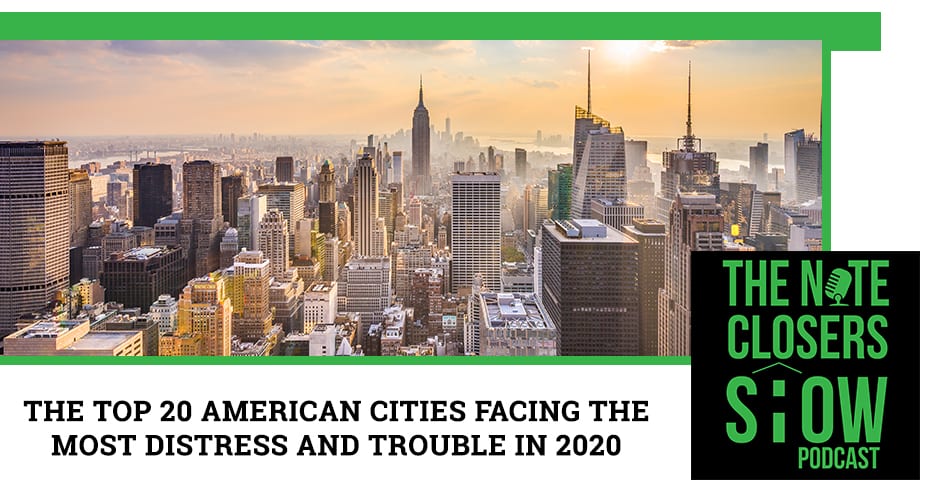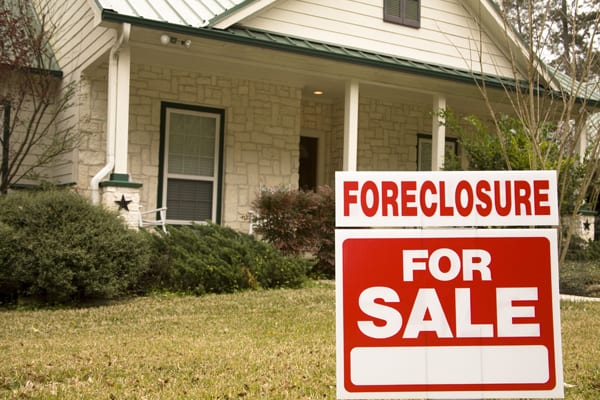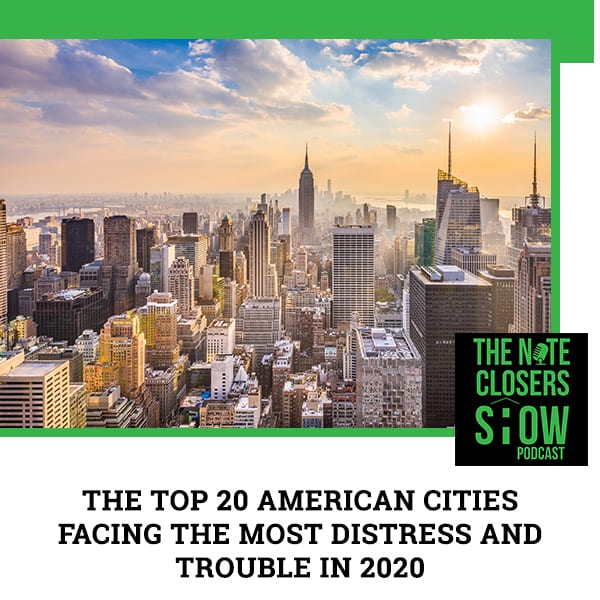
In this episode of the Note Closers Show podcast, Scott Carson discusses a current article from WalletHub discussing the top 100 cities in the United States that are seeing the most amount of distress and trouble in 2020. We discuss the cities that have the largest number of distressed borrowers, bankruptcy filings in the past year, distressed accounts, reduction in credit scores, along with online searches for debt and short term loans. The top 10 includes five cities in Texas which is what surprised us the most about this article. Here is the original article – https://wallethub.com/edu/cities-financial-distress/79863
—
Watch the episode here
Listen to the podcast here
The Top 20 American Cities Facing The Most Distress And Trouble In 2020
In this episode, I want to talk about an article that I came across and I want to do a bit of a dive into it because it brings up some points and some things that are taking place that I don’t think a lot of people think about. I’m talking to a lot of other real estate investors, realtors, mortgage brokers. I want to talk to those that keep thinking that there’s not going to be an issue. I hear this from some of my friends in different parts of the country, Dallas, Houston, Miami, Southern California, San Diego, LA, even Northern California, San Francisco like, “Market is great here. We’re not going to see a downturn here in our neck of the woods.”
WalletHub’s Top 100
I have to tell people, “You haven’t seen the majority of issues.” Yes. Do we know that there’s been a job loss? Check, we know that. Do we know that people have been laid off? We know that. We know that businesses are closing. We know that people aren’t paying their mortgage payments. What you may not see are other habits or other identifying factors taking place across the country. I was very blessed to come across an excellent article from WalletHub discussing some of the things that are going on. I wanted to bring it up to talk about it because it identifies the cities that are being hit the hardest when it comes to what’s going on in the country.
It basically identifies the top 100 cities with most people in financial distress during COVID-19. The thing I want to go through with this. We know the amount of unemployment rate has been slowly improving as the country reopened. We know that 12.6 million Americans are still out of a job. In addition, one survey says nearly 69% of Americans would find it somewhat difficult or very difficult to meet their current financial obligations if their next paycheck were delayed even for one week. You also have to realize that some people in some cities fared better than others. What WalletHub did is it compared the 100 largest cities with data limitations across nine key matrices. It includes factors like the change in the number of bankruptcies filings between June of 2019 and June of 2020. The average credit score if it’s gone up or gone down and the share of people with accounts in distress.
It means multiple accounts with distress, credit cards, car payments, student loans. It also did something interesting I found valuable are people that are in places and cities where people are Googling, looking for loans, looking for bailouts, looking for a variety of issues that deal with finding money for the most part. I’m pulling up this list here. I was surprised about how it hit. Literally, the nine things it talks about is a credit score. Here’s the thing. Search interest for debt, search interest for loans. That’s two different things. Bankruptcy filing increasing, the average number of accounts in distress, people in distress. We know that because of forbearance agreements or people being laid off credit scores and they’ve averaged the total score.
What might surprise you and might not surprise you are the cities that hit that part. The first 1 or 2 is not a big surprise because of everything going on there and how heavy it was hit with everything being shut down. The number one city facing difficulties with most people in financial distress is Las Vegas, Nevada. Their ranking score across these nine major cities had a total score of 2%. It was the number one score. The credit score was okay. We ranked fourteen people. Distressed is number five. The average number of accounts in distress was number two. People living in Vegas says that they’re distressed on mortgages or their mortgage payment. Bankruptcy filings increased. They were about 41. Searches for debts was roughly in the fifteen areas. Vegas, think about it. Obviously, big tourism, big city when it comes to living there.
Who doesn’t love Vegas? I love Vegas. We’ve been talking about going back to Vegas. What happens in Vegas doesn’t always stay in Vegas when it comes to a national pandemic. The number two city was Chicago, Illinois. Overall, a steady score, 34th when it came to credit score. It’s the same thing. Number 33rd for people to distressed. Search for loans though, it ranked number one. People that are looking for loans. It came in at number two. The biggest surprise on this list so far was 3, 4 and 5. I only say this because of the fact I’m in Texas. In Texas, we’ve been very blessed even going back to the previous Great Recession in 2008, 2010. We didn’t lose a lot of value.

Distressed American Cities: The unemployment rate has been slowly improving as the country reopened, but 12.6 million Americans are still out of a job.
Texas stayed fairly level. I have a lot of friends in Houston like, “Everything’s going great here.” Surprisingly, Houston came in third. I don’t think it was because of COVID. Houston has been taken and on the chin with hurricanes and the floodings. It’s the number one county in Texas with an increased number of foreclosures and defaults. That’s been the case before COVID. COVID didn’t help anything. Houston came in number three with a score of 66.7. That followed up surprisingly with the Alamo City, San Antonio, Texas. It came in fourth. Number five was Dallas, Texas. It ranked in the 39 for credit scores, people are distressed 58 out of 100. The average number of distressed lowered number at 69.
The bankruptcy filings, top 30. The search for people looking for loans and debts ranked high. San Antonio ranked number four for credit score drops since COVID kicked in. Six was Phoenix, Arizona. Seven was LA, California. That’s a big surprise. Number eight, surprisingly, was my hometown of Austin, Texas. Austin, Texas did not do well. It’s ranked eight as the city being hit the hardest with COVID, which I find surprising. It had a score of 65. The numbers between 3 and 8 were less than 1%. Austin, Los Angeles, Phoenix, Dallas, San Antonio and Houston all could have been in that market right at anywhere from 3 to 8.
Surprisingly, we had a couple of cities there that hit hard. You look at Miami. It came at number nine. Miami, Florida scored 60. Ten was Fort Worth, Texas came in at under 60 with a score of 59.72. You had five cities out of Texas in the top ten cities being hit the hardest out of 100. That’s the thing you’ve got to keep in mind. Our biggest cities in Texas are ones that are part of the problem of people that are seeing issues when it comes to credit score, decreases the number of distressed accounts, people in distress, bankruptcy filings and people searching online for debt assistance, and also for loans. Five out of the top ten falls in the Lone Star state. Houston is three, San Antonio is four, Dallas is five, Austin is eight and then Fort Worth is ten, which is surprising.
As we start dropping out of the top ten, Memphis rolls in at number eleven. I could see that being hit pretty heavily hard. It ranked number five. It was the fifth-highest when it comes to credit score drops. This is not a surprise of Memphis being a high rental market. Eighty-five percent of the city are renters. Number twelve was the Big Apple, New York. They came in at a score of 57.72. San Diego is the thirteenth largest impacted city out of 100. I’m surprised on that because San Diego has always been so great and people there but yes, it’s been people who’ve been hit hard. They didn’t do bad as far as credit score drops. They ranked at 68.
The number of people distressed is 54. The accounts in distress were low at 85 but when you start looking at bankruptcy filings, you saw it ranked number thirteen. That was the second-highest behind Austin. Austin came in number ten for bankruptcy filings out of the top 100. Rolling on from San Diego, you go across the country to Jacksonville, Florida. They came in at number fourteen and then Orlando. I thought Orlando would rank higher on the list than they did. Orlando is the fifteenth highest-ranked city in distress. It wasn’t so big across the board. When you look at credit scores, it stayed about the same. It was ranked 85 out of 100. What was surprising was the fact that it ranked fifteenth in most people in distress. That’s probably because of all the touristy Disney, Universal Studios and the average number of accounts that came in ranked as fifteenth.

Distressed American Cities: Five out of ten fall into the Lone Star state – Houston, San Antonio, Dallas, Austin, and Fort Worth.
From Orlando, you see Cleveland, Ohio. It came in at 54.5. Laredo, another Texas city down South near the border came in at seventeenth. It ranked number three for the number of people in distress out of the top 100. It ranked six for the average number of accounts in distress. When you figure those two, I would have figured that the FICO scores would have been a bigger hit than the top ten, but it ranked twelfth for the biggest change in FICO scores. Rolling onto that, you had Indianapolis come in on the eighteenth. Philadelphia was nineteenth and the nation’s capital, Washington DC, was at twelfth. Atlanta came in at 21, Detroit at 22, Mesa, Arizona was 23. North Las Vegas came at 24 and Des Moines, Iowa came at 25.
I’ve seen some other numbers on here. Tampa was 26, Nashville, 27, St. Louis 28, Denver, Colorado, 29, and El Paso 30. I’m not going to go through the whole list here of 100 on these things because you can go literally to the link. You can click on it and check everything out for you guys as well. It was an interesting article. That’s the thing you’ve got to realize. It’s not the forbearance numbers that we see. It’s not unemployment numbers. When you take these numbers that we see that they disclosed and then you roll that in with what we’re seeing from the borrower’s financial list, as far as the banks with an increased amount of defaults. That number going from $85 billion in Q2 to over $120 billion in Q3 with the numbers increased by close to $30 billion-plus. It’s affecting people in a variety of fashions.
If they’re not getting paid, they’re using their credit cards to pay for some things. We can understand that going. Also, people are having to pick and choose. Are they going to pay their student loans? Are they going to pay their car payment? Are they going to pay other debts? Timeshares. Are they going to pay other loans they have? The second card, car payments. That’s the thing to keep in mind too. I’ll give an example. JPMorgan Chase, a big lender sent out to everybody else, “If you’ve got an auto loan with us or a mortgage, let us know. You can apply for a forbearance immediately on our website very easily.” It was 100% approval right there for 90 days. They’re willing to extend it all out there for you as well.
Foreclosure Timeframes
The numbers might be a little skewed that it may not be a figure in. You may have people out there that could have qualified for forbearance agreements on a variety of that’s never called. They never called their student loans nor their credit cards. They never called on their mortgage loan payment, whatever else might be out there to delay things. They assumed, which we all know that assuming. It means making an ass out of you and me both. The thing that you have to keep in mind here is when you start seeing these identifiers. Does this mean we’re going to see foreclosures in the fourth quarter? I’m going to tell you, we’re not going to see a huge amount of foreclosures taking place in 2020.
We’re going to start seeing those in Q1 of 2021. That’s foreclosures. That’s not note sales. There’s a big difference there. We’re seeing a variety of banks have sent us lists to look at where they have the foreclosure dates that have been delayed. They were either set to go in Q3 or Q4 that had been pushed out to who knows when. Will it take place in the first quarter of 2021? Will it take place in January? Is Biden going to delay things another period of time? Another 60 days, 90 days, 30 days. Even if they left the December 15th executive order to expire, I don’t think Trump will probably extend it. He may before he leaves office in January 2021.
What I’m trying to get at is something you have to keep in mind. It’s going to be different. It’s not going to be a gong goes off. Suddenly we have this wave of foreclosures. What you have to figure in when it goes from an executive order like that, then it goes back to the statewide level. What happens at the statewide level? Each state is completely different. We know when it comes to foreclosure timeframes. Texas, obviously, fastest in the nation, 21 days prior to the first Tuesday. If you filed the notice of default demand letter or anything like that, you can foreclose. Georgia is second. You look at what’s going on in other states, New York being in the top ten. It’s one of the longest foreclosure timeframes. It’s going to take a while for banks and lending institutions that haven’t filed in New York, New Jersey, the two longest states to foreclose for them to get that docket rocking and rolling again.

Distressed American Cities: We’re not going to see a huge amount of foreclosures taking place in 2020. We’re going to start seeing those in Q1 of next year.
Will they have the rocket docket? What does the rocket docket mean? It means if it’s a vacant property, you can expedite the foreclosure. New Jersey has had that for years. New York has still always been slow, two-plus years to foreclose. What we see is an increase in Florida. Governor DeSantis will step in there and delay foreclosure, delay evictions with everything taking place, especially when you have to look at what’s going on with the cruise industry still suspending things until the first of the year. The CDC and then National Cruise Industry came out and said, “You could technically start doing things here in November,” but it’s going to take them a month at least to figure out their sanitation procedures. The cleaning procedures, what to do, how to keep everybody on safely, how to keep everybody off and how to interact. All that goes with the clean stuff.
What ports can they go into? What ports can they not? Will it be domestically to the Bahamas or Barbados and back or their own little islands in the Caribbean. It’s going to take a while to get those people back in the country from other places and going from there. Do I have a clear answer? No, I don’t. What I can tell you that this article tells you more than anything else you need to take a look at is look at what’s going on besides a person’s mortgage. Look at what’s going on besides COVID and job loss. There are a lot of other factors that are growing and building that pressure. That pressure cooker on other people’s feet. If they can’t pay their rent, mortgage or aren’t paying it because they don’t have a job or they can’t get caught back up.
Living Off Credit Cards
They’ve had to live in other means, credit cards being the number one thing. If they don’t, they eventually run out of credit cards or credit card companies reduce lines of credit, which they have been known to do in the past. They’ve already started doing it if you’ve been using it. On the opposite side, if you are on the good side where you’ve been paying your mortgage, you’ve been responsible with the lines of credit and other things and you have business accounts, you’re starting to see an increase. The banks and credit card companies are giving you lines of credit because you’ve been responsible for it. Those that needed the most that are searching for it and stuff like that, you’re not seeing it. Those that don’t need it, they’re giving it to you. I know it seems to ask backward but think of this, it’s the way the banks look at you as a borrower. It’s the way they evaluate you as an individual.
What are you using? How smart do you use it? Are you only using 35% of your credit limits? Are you paying on time? Are you paying extra or you’re using it smartly or not using it smartly? You have to keep that, all of these things in mind. That’s why I want to put this out there to everybody. If you’re investing in a city that’s in the top 100, you proved me wrong. I was shocked and surprised to see the top 10, top 20 cities in America, being some of those that are supposed to have been doing well or the hottest real estate markets in the country. Vegas isn’t surprising at number one, New York wasn’t a surprise at twelve. When you look at the Lone Star state, you look at some of the other things that pop up in there. Those are big surprises.
Finding Opportunities
Everybody has gotten caught up in what’s going on in the election and who’s going to win, who’s not going to win and who’s doing what. We’ve taken our eye off the ball. We’ve taken our eye off of where everything is at and that’s not a good thing. You’ve got to know what’s going on. You’ve got to stay abreast of the situation and realize that there are going to be some opportunities in those cities. I don’t think so much in Texas because it’s such a fast foreclosure state. The banks are going to run through them or they’ll move the debt off or allow people to forbearance and bump the 6 or 9 months to the back of the loan like a lot of the government banks will do. That still means more so than anything else, you have to look at the commercial loans in each of those top ten cities. We’re already seeing that here in Austin.

Distressed American Cities: There’s a clogging of the financial arteries in the country, specifically in these cities out there.
When I do leave the house, which I used to go to the grocery store, Lowe’s, the movie theater or do breakfast tacos on the weekend, go to the farmer’s market. I try to take a different place around Austin here on the north side to see what’s going on and see which businesses are closing, how much more for lease signs am I seeing. I try to point those out. It is a mixture of not only mom and pops that are struggling but also national chains. They’re closing, shutting things down and you’re seeing an increase in this. I see our mall has struggled. Our mall on the north side here in town, Lakeline Mall is what they call it, has been struggling for a few years. Major chain and mall has been struggling but also seeing hotels that have been under construction for two years has come to a stop.
We got one right around the corner here and I keep sending an email to the asset manager of the bank whose name is on the sign out there trying to see if they’re willing to sell that note. I guarantee they’re going on two years without any payments in. The hotel has been dramatically delayed in a couple of fashions. It’s going to be hard to tell what happens as things don’t improve. If they continue to keep venues closed and we have another peak, it’s going to get a lot worse. For those of you that are out there like, “It’s going to be great. We’re not going to be a big decline.” I’m sorry. I’m going to be the devil’s advocate here and counter you on that because of everything else that I’m seeing, everything else on the pulse.
It might be like somebody walking along. It could be the perfect image of health but underneath, they’re starting to have their arteries clogged. I’m starting to see that clogging of the financial arteries in the country and specifically these cities out there. Stay tuned. One of the best things that we have done was definitely doing the top 40 markets on the Note Nation Top 40 Tour that we did, highlighting different cities. We are seeing an increase in the cities that we highlighted. I’m surprised that Washington, DC and Philadelphia have had the two most amount of hits on those video replays working organically. People are starting to look, people started to pay attention. Those videos, which average about an hour-long, somewhere between 45 and 60 minutes long. They’re seeing an above-average play on them. Not 2 minutes, not 8 minutes, but 16, 20 to 30 minutes on those videos.
That tells me more people who are looking for information in those cities. They’re looking to see what the opportunities are. They’re also looking to see where the biggest pain points are not only residential but commercial-wise. It’s going to be an interesting 2021. The election we’ll have nothing on what we’re going to see taking place in 2021 and beyond. I want to respectfully advise you to keep an open mind and pay attention to things. You are seeing stress factors take place at my level. At WalletHub, there were articles talking about not only the search engines but the number of bankruptcy filings. You’re going to see that number dramatically increase in the next twelve months.
I didn’t even think about this until now. One nice thing I can do on this list is I can go on here and filter it by that number. When you look at the top cities that file bankruptcy Des Moines, Iowa, which ranks 25th nationally on this list, has a number one bankruptcy filings. Honolulu, Hawaii is number two. That’s not a big surprise there with 33%, 35% unemployment rates. They were ranked 56 nationally, which I find surprising. Richmond, Virginia was number 3 of bankruptcy filings, number 47 overall. Plano, Texas was 4th in a bankruptcy filing, 60th overall. Denver, Colorado, Rocky Mountain High, number five and they ranked 29th overall. Winston-Salem was number six in increased filings year over year. They ranked 50th. Louisville, Kentucky was number 7 and they ranked 36 nationally overall. Birmingham, Alabama ranked 8 and was 39 overall. It was number four for bankruptcy filings.
Omaha, Nebraska was number 9 and they ranked 66th. Austin came in at 10 and they were ranked number 8 as the worst city. There’s your top ten. Am I going to see some things here in Austin, Texas? I hope so but I also hope not. We’re already seeing things, so please keep in mind. The bigger city you live in, you may not see as much stuff, but you have to start looking at the city yourself versus where you’re going. If you’re on the same trip every day, driving to work, driving to the office and you’re taking the same road, it may not look differently along those main thoroughfares. What’s looking differently is the sub-thoroughfares. I won’t say those are secondary markets but those secondary roadways, those other areas besides the main drive to and from your city downtown and things like that.

Distressed American Cities: There are opportunities if you know where to look and how to look at things.
Keep that in mind. Be smart. If this tells me anything, America needs help more than anything else. Borrowers need help with more than anything else. I’m looking forward to talking to Merrill Chandler the next time we have him on to see if he has any insight into what FICO’s new scoring thing were doing if it has anything to do with this article from WalletHub. It would be interesting to see. We all know that FICO and the banks are looking at your credit scores, they are pulling your credit, checking things out, whether you have a major purchase or major thing. It does affect you across the board. It would be interesting to see what happens on that. I know that I’ve sent the article to Merrill and he’s interested to be on an episode to talk more about that.
An Interesting Time
There are opportunities if you know where to look and how to look at things. Could you jump on your county records and do a search for people filing bankruptcy in your city and states? You can. You go to Pacer.gov and do searches for stuff like that. It happens all the time. Attorneys have been doing that for years to market to people. Can you look at the search history? No. It’s not the easiest thing to look for search histories but you can also maybe even reach out to TransUnion and other credit companies to see about buying data on an increased number of delinquencies and things like that. It might be a positive potential marketing tool for you to buy a list like that. My fellow Americans, fellow note investors out there, it’s going to be an interesting time. Take a deep breath, breathe and realize that there are a lot of things going on that not everybody has all the information. You have to make some decisions for yourselves.
One of the big things that I brought this up was to give people an idea of some of the cities that they’d be targeting them. If you’re getting listings from asset managers, do you know what I would do? I would take that 100 lists and that’s my 100 cities, getting rid of New York or the states that I don’t want to buy in. Kentucky has the million-dollar bond or New York is such a long foreclosure process. New Jersey takes forever but the other places out there besides Chicago, forget Crook County, but that would be my hotlist. Anything in these cities, my top 90 cities, that would be a good starting point for you if you’re looking for deals and you started targeting banks out there and trying to get listings. Start looking at the cities. We are getting listened and when we see lists coming in that they’re cities that we don’t recognize, we don’t know, kick them to the left and keep moving on.
Let me give you an example. Let’s say it’s an hour outside of a major city. You should not be paying the same price for that asset as you would if it was in the main city. Why is that? If I’m buying in Austin, Texas and let’s say it’s in La Grange. It’s on the way to Houston or even Elgin. It’s about a 30 to 45-minute drive to La Grange or Somerville. Somerville is a better example. Somerville is a small town, but since it’s in Texas, it forecloses quickly. It’s far enough removed that if you have a big spike taking place to see defaults and foreclosures, it’s going to be hard to get crews to go there to do the work. We saw this taking place in 2018 and 2019 in Flint. Flint is a good-sized city, lots of good deals but it was hard to get a rehab crew in Flint because they would rather be in Detroit getting paid bigger bucks to do stuff in Detroit. You have to take that into consideration. I’ve got a buddy in Houston that ran into too. Even at the storm, he bought a lot of distressed properties with the idea that you get a rehab and he wasn’t buying the notes. He was buying the foreclosures, getting them as distressed. It took twice as long for his rehab numbers because it was difficult to find the crews.
All of his projects were completely under finance and his money costs ate him alive on his project because he figured six months and it took over a year. Keep that in mind. You want almost double your cost. If you’re in the note business and raising capital, you need to be changing agreements from 12 to 24 months to 24 to 36 months as a minimum. If we do have another delay, another kick-out, and we’ll know that here shortly, what’s going to happen with that? That’s going to have a major impact on what you’re doing and how you foreclose or how you’re evaluating things. If you’re buying notes at those fast foreclosure states and the borrower isn’t interested in forbearance for long and you have to foreclose, expect to hold it but you’ve also got to be a lot more flexible. If you wanted to take the property back and foreclose, you’ve got to be willing to do a forbearance or some trial payment plan for a period of time taking them back on track.
It is an interesting time to be alive. It’s interesting to be an American. It’s definitely an interesting time to be an investor, whether you’re in the rental markets, the wholesale and the fix and flip, residential commercial. There are tremendous amounts of opportunities if you know where to look. You’ve got to get off your ass, roll up your sleeves and get to work. I encourage you all to do that. If you’re looking to learn more about the note business, I highly encourage you to check out our one-day note weekend class. It’s a great way to dip your feet in the water. Dip your toes in the water in the CliffNotes version of note investing to see if it might be something that you’re truly interested in. With the number of opportunities taking place, I guarantee you will be 6 to 12 months ahead of most investors out there looking for other deals. Go out, take some action, be safe. God bless the USA and we’ll see you all at the top.
Important Links:
Love the show? Subscribe, rate, review, and share!

